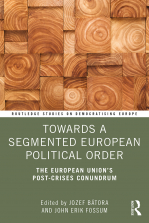

European Crises and Foreign Policy Attitudes in Europe.
Onderco, M. (2020) “European Crises and Foreign Policy Attitudes in Europe” In Bátora, J & Fossum, J.E. Towards a Segmented European Political Order: The European Union's Post-crises Conundrum. London: Routledge, 225-242
The impact of the financial crisis on the foreign policy attitudes in Europe is crucial for the study of the democratic legitimacy of European foreign policy. The claims of those who state that the crisis led to changes in foreign policy attitudes in Europe need to be qualified. Individual experience of crises is associated with change in foreign policy preference. The results show that the nature of the constraints which stem from public opinion, which emerges as an aspect of the segmentation of the European political order, varies between the old and the new European Union Member States. In Central and Eastern Europe, however, perceptions of identity threat are associated with more negative views of the United States and more positive views of Russia. European integration has become a hotly debated topic in domestic politics in the politicisation of European integration, which gave rise to the emergence of public attitudes that question the very utility of such integration.